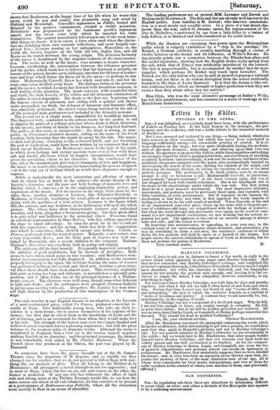HA.HTLE Y COLERIDGE.
Sin—I have to ask you in fairness to insert a few words in reply to the review which lately appeared in your paper upon Hartley Coleridge. Had that review concerned only Hartley Coleridge's writings, and comprised the- reviewer's opinion thereupon, I should have been silent, however much I might have dissented: but while his character is distorted, and his biographer abused for not making the portrait ugly enough, and leaving it to the re- viewer to supply the defect, I am compelled, however reluctantly, to say something in reply. For ten years I knew Hartley Coleridge, was with him for days and months- together, and when I did not see him I often heard of and from and about him. During that time I never saw nor heard of any "scenes of filth, riot,. and debauchery," the lack of which the reviewer laments as a contrast to- " traits of loveliness and purity." A contrast they would assuredly be; but, unfortunately, at the expense of truth.
Hartley Coleridge was not a compound of a devil and angel. Why he fell, I am not wise enough to know, nor sceptic enough to complain. He fell, as poets have fallen ; but in his fall he neither grovelled nor weltered. He was no more than Charles Lamb, or Campbell, or Burns, perhaps somewhat less diseased. Why should his flesh be painted loathsomer [Had Mr. Blackburne reperused the paragraph containing the words which he quotes as offensive, before determining to get into a passion, he would have seen that they apply to Hogarth's pictures, and not to Hartley Coleridge's life. For our general estimate of Hartley's character we are accountable to the public ; but we would hint to Mr. Blackburne, that other people besides himself knew Hartley Coleridge, and that our remarks rest upon facts too, widely spread and too well ascertained to be doubted. As for his compari- son of Hartley Coleridge to Burns, Lamb, and Campbell, not even the ties of grateful remembrance and personal esteem can excuse its ignorance or recklessness. Mr. Blackburne first mistakenly supposes that we have libelled his friend ; and, to clear him from an aspersion never thrown upon him, de- grades the memory of three of the most illustrious men of our age, all of whom were remarkable for their manly independence, and two of them for noble sacrifices to the comfort of others, near and dear to them, and grievously afflicted.]


























 Previous page
Previous page